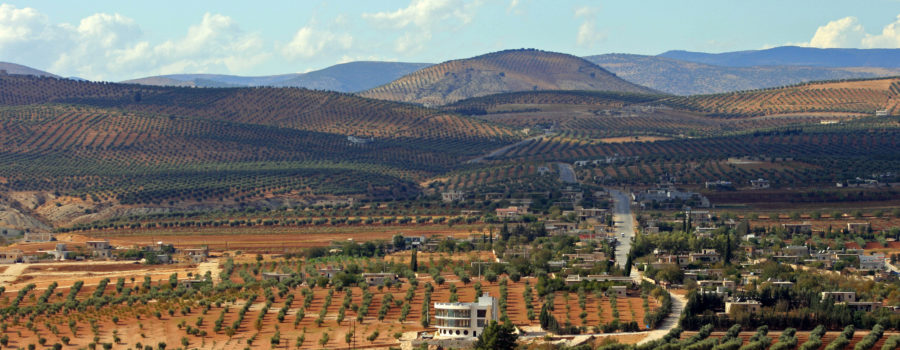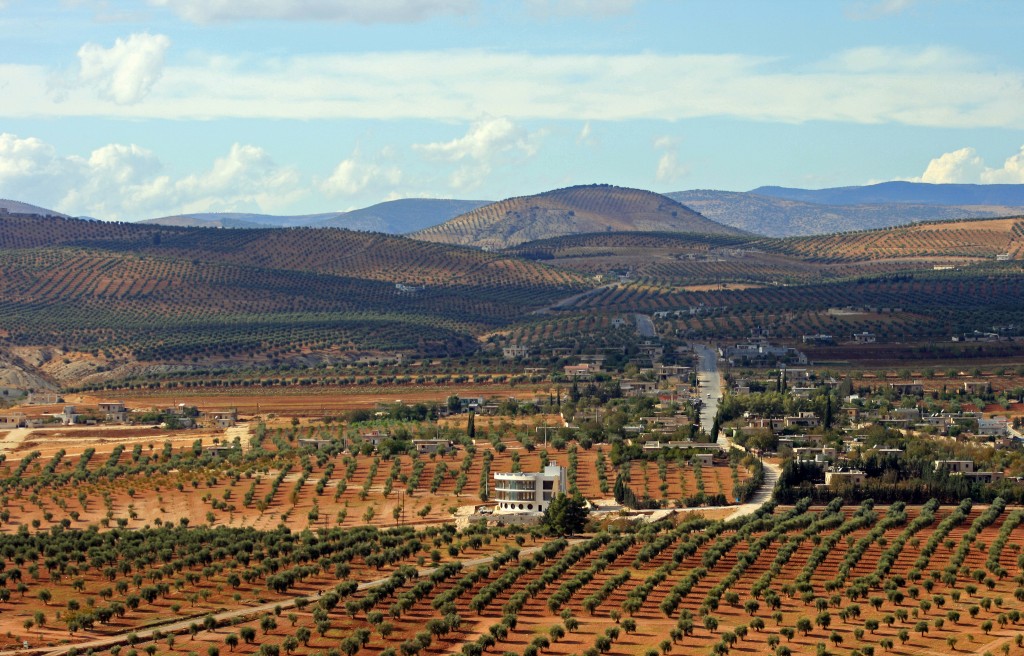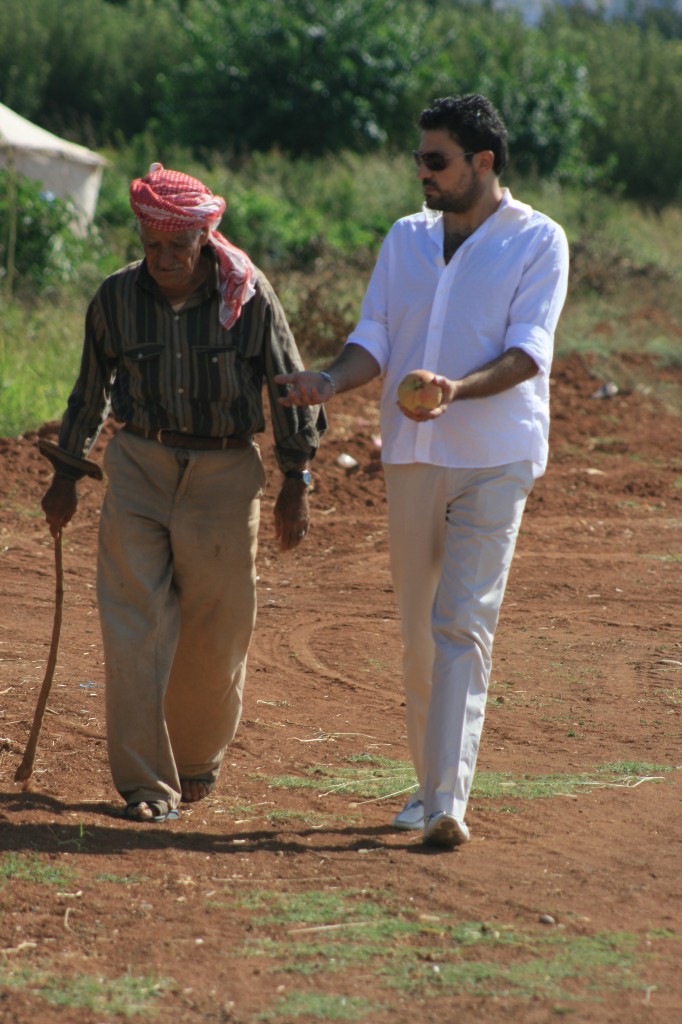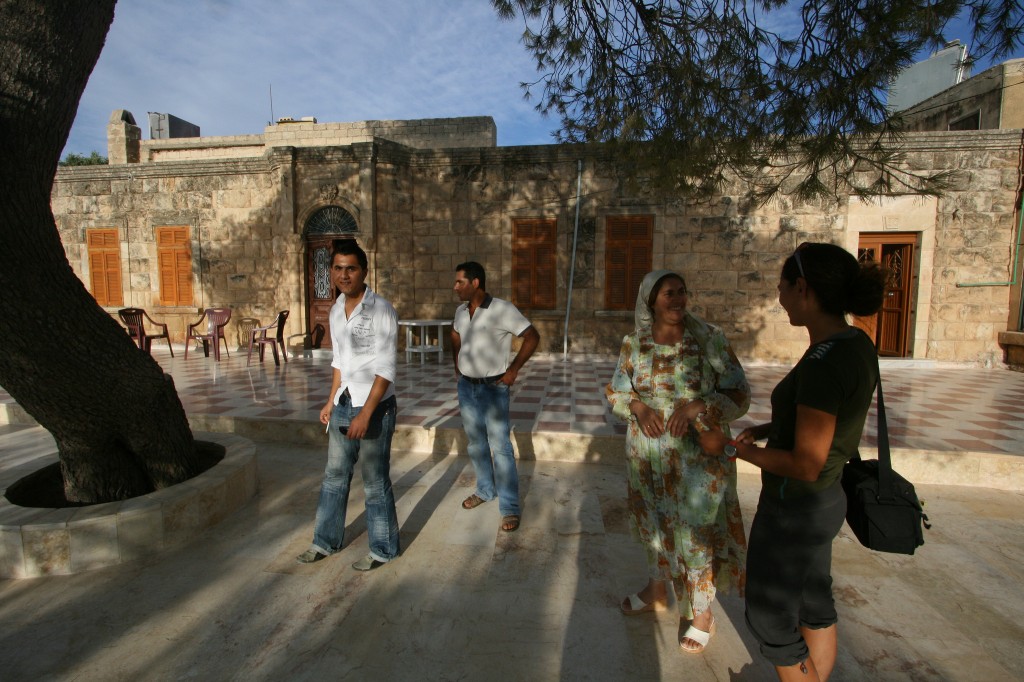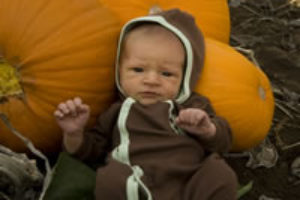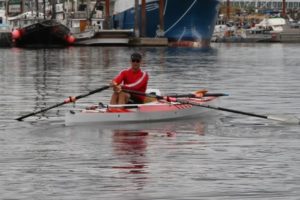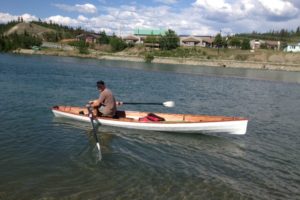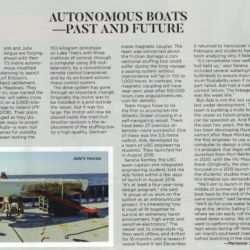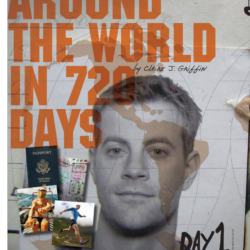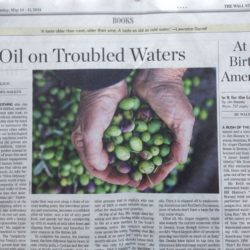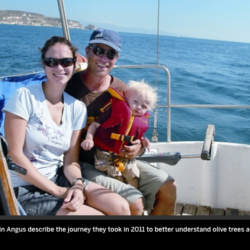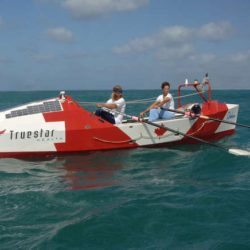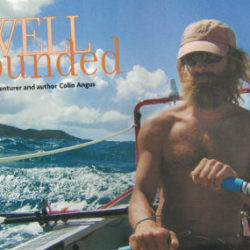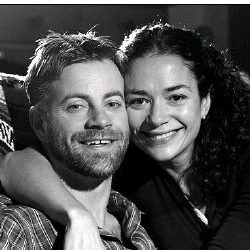Last year we organized a fundraiser for Julie’s family who were struggling to live in the turmoil of Syria’s civil war. We’ve had a lot people asking about their wellbeing, so we’ve decided to devote most of this newsletter to updating their plight. First, however, we have a couple of other bits of news:
RowCruiser Camp: Just a reminder that our RowCruiser kit building class will be taking place this February in Port Townsend, Washington. We’ve partnered with U.S. – based Small Craft Advisor Magazine to sell kits and to host the build class. The RowCruiser is the meant to be the ultimate recreational rowing craft for exploration. It has a small sleeping cabin, an efficient sliding seat rowing system, and is immensely seaworthy. The build class is for beginner builders who would enjoy having the additional guidance putting the kit together. And Port Townsend is a fantastic location to be. It has a rich nautical history and is one of the driest areas in the Pacific Northwest. For more information, please visit www.rowcruiser.com
Olive Odyssey: With the upcoming holiday season, why not pick up a few copies of Olive Odyssey for gifts. From the Wall Street Journal to the National Post, it’s received fantastic reviews and has been selling well. It’s available in most book stores and will be appreciated by foodies, sailors, history buffs and armchair adventurers.
Here’s what the Vancouver Sun had to say about Olive Odyssey: “Olive Odyssey is also a beautifully written travelogue, describing in enticing detail some lesser known places along the Mediterranean coastlines of Spain and France, the islands of Corsica and Sardinia, and Greece. Angus writes with an engaging narrative voice, often sharing personal thoughts and emotions… “
Syrian Family Update: There’s good and not-so-good news relating to Julie’s Syrian family. The positive development is that one of Julie’s cousins, his wife and children have been able to immigrate to Germany as refugees. Of all the western countries, Germany has been the most generous in accepting refugees, so far welcoming a total of 70,000 displaced Syrians. Unfortunately, the Canadian government has a very low quota (Doug Saunders of the Globe and Mail wrote an interesting article on this subject), and so far only 200 Syrians have been accepted into Canada. Canada’s loss is Germany’s gain. Julie’s cousin is a pharmacologist, his wife a gynaecologist, and will undoubtedly be a positive contribution to the German economy. Beyond potential economic benefits, however, Germany’s actions demonstrate a moral compass that our government has yet to display. In 1939 Canada turned away a ship of Jewish refugees. They were forced to return to Europe where many faced death. Canadian values have changed in the 75 years since that tragic decision, but do our government’s actions really reflect this?
Overall, most western countries are doing far too little to accommodate Syrian refugees, meaning hundreds of thousands will be living perpetually in squalid refugee camps, or will return to the dangerous life they tried to escape.
Another of Julie’s cousins has made a dangerous and precarious voyage through the Mediterranean in an inflatable raft, arriving on the shores of Greece. It was a desperate decision, but given the alternatives, a necessary one.
Unfortunately, not much has changed for other members of Julie’s family. Julie’s uncle, his wife and three kids are still living in Aleppo, and their small apartment is situated on the frontline between the regime and rebels. Bodies, bomb blasts, and stray bullets coming through the windows are the continued reality for his children. Two days ago a mortar landed metres from their ground floor apartment, but miraculously did not detonate. Julie and I stayed with them at the end of our Scotland to Syria expedition, and we got to know them well, enjoying delicious Middle Eastern meals and learning about Julie’s history.
For those who have read Julie’s recently released book Olive Odyssey, you will know that our olive adventure was inspired by our visit to her aunt’s olive farm north of Aleppo. This farm is situated in the Kurdish part of Syria near the Turkish border, a region that has recently featured prominently in world news as a battle between the Kurds and ISIS rages.
Here in Canada, the turmoil going on in Syria may be hard to keep track of with so many different groups and interests involved. Before bringing you up to date with the family olive farm, I will provide a summary of events in Syria to provide context to the situation.
Initially, the conflict in Syria was mainly an attempt to overthrow the dictator Bashar al-Assad. Moderate rebel groups fought the regime attempting to topple Assad and bring forth democracy. The rebels received little international support, and Assad’s forces fought back vigorously creating an ongoing stalemate.
During this multi-year civil war, a new group arose in Syria, ISIS, which is an offshoot of Al Qaeda. ISIS is one of the most ruthless militant groups ever known, and their tactics include beheadings, ethnic cleansing, and enforcing Sharia Law. Their primary interest is not in toppling Assad, but simply to create a caliphate, or Islamic state, and expand their control and influence as quickly as possible. (As a side note, sadly the name “Isis” has become tarnished. It is a Phoenician/Egyptian goddess representing motherliness and fertility. Isis also protected seafarers, and our boat that we sailed in the Med during Olive Odyssey was called “Isis”.)
ISIS quickly took over large swaths of Syria and Iraq. In Sunni Arab regions the inhabitants are forced to follow Sharia Law. Those that oppose ISIS are killed.
Minorities, and those who practice different religions, such as Christians and Yazidis are treated with much greater hostility, and usually must flee or be killed in the hands of ISIS. Babies, children, women and the elderly are slaughtered indiscriminately. Severed heads are displayed on fences and poles as a tactic to inflict terror and compliance.
Kurds are included in the groups that ISIS despises, and several months ago they tried moving into the Kurdish region of Iraq. US airstrikes and additional support for the Iraqi Kurds helped to repel ISIS. Having been thwarted by the Americans and Kurds in Iraq, ISIS launched into the Kurdish region of Syria with even greater force.
One might wonder why ISIS vehemently opposes the Kurdish people, when most Kurds are Sunni Muslims. The reason is because Kurds are a secular, egalitarian and (relatively) liberal group. During the war in Iraq, the Kurdish region was the only place where allied forces were never attacked. The Kurds also harbour and protect Christians, Yazidis, and other minorities. It is the western leanings, and liberal ways of the Kurds that inspires the hatred of Isis.
During our own travels in Syria, we were struck by the contrast when we entered the Kurdish region. The copious amounts of garbage we had become accustomed to lining the roads disappeared, and we were greeted by an orderly landscape comprised of tidy olive tree plantations and picturesque villages. The homes were made from stone, often adorned with marble patios and grapevines. But what was most striking were the people. Women wore jeans and tee-shirts, and often their heads were uncovered. Some of the younger teens wouldn’t have looked out of place in a western high school. Julie’s Kurdish cousin explained that the Kurds follow a less strict interpretation of Islam with more relaxed attitudes towards things such as clothing and consuming alcoholic beverages.
Assad ceded control of the region to the Kurds and recently it has been operating as a semi-autonomous region, where it is one of the few examples of a functioning democratic system in the Middle East. Not only are the Syrian Kurds providing a shining example of democracy in sea of dictatorships and failed democracies, but it is also a society that strongly supports equal rights between men and women. 40% of seats in council are reserved for women, and a co-commander for their mixed-gender militia is female.
Everything the Kurds stand for is the antithesis of ISIS, and ISIS was determined to take over the Kurdish lands and purge the inhabitants. They moved into the outskirts of the Syrian city of Kobani, swept through the smaller surrounding villages, and then launched an assault on Kobani itself. Up until this point, ISIS has been successful in most of its military quests defeating and humiliating various armies including the US trained and financed Iraqi army. The battle for Kobani was expected to be an easy win – the powerful ISIS militants were up against a local, lightly armed militia. They underestimated the Kurds, and for the first time ISIS met its match against this female led-militia. ISIS was unable to advance into Kobani, and despite allocating a huge amount of resources to the effort, a stalemate ensued.
Julie and I followed the start of the battle with dismay. Despite the Kurds’ heroic efforts, the West initially did little to help them. It was inevitable that with diminishing munitions and supplies, the Kurds would eventually cave to the powerful army of ISIS. If Kobani falls, most expect that ISIS will continue through the rest of the Syrian Kurdish region in a wave of death and destruction.
Why was the west not intervening? A big reason was Turkey. A large population of Kurds reside in Turkey, and Turkey brands the armed component of this group, the PKK, as terrorists. Because of affiliations between the Turkish Kurds and Syrian Kurds, Turkey identifies the Syrian militants as terrorists as well, and chose to block any aid or military assistance, which would have to pass through its border. Because Turkey is a member of NATO, it initially had significant influence on what happened to Kobani.
Furthermore, it was becoming clear that Turkey had offered support to ISIS in various ways, including allowing ISIS militants and funds to cross its border into Syria. Turkey’s tactics clearly indicated it wanted the Kurds to die at the hands of ISIS. It wasn’t Turkey’s inaction that spoke so clearly of its intentions, but rather its actions to thwart other countries from offering assistance to the Kurds. Its plan was to allow a democratic egalitarian society to succumb to the most blood thirsty tyrants known in modern history. The Turkish government stated that it felt the Kurds were as much of a threat as ISIS. Not only would it not allow aid to pass its borders for the Kurds (Kobani sits right on the Syrian/Turkish border), but it refused to allow the United States to use its military airstrips to launch attacks on ISIS.
The United Nations pleaded with Turkey to allow passage of supplies and munitions to the Kurds to avoid impending genocide. French President, Francois Hollande, also strongly urged Turkey to allow aid to cross its border into Kobani to no avail.
To understand the Turkish disdain for Kurds, it is necessary to step back in history. The Turks have launched several waves of genocide against the Kurds. This is not discussed much, since Turkey is a key NATO ally, and has never acknowledged or admitted to its acts of ethnic cleansing. The furor that erupted when Stephen Harper acknowledged their genocide of the Armenians illustrates the sensitivities at hand. But facts speak louder than the silence. The past uprising of the Kurds in Turkey is a result of the oppression, persecution and cleansing they have faced at the hands of the Turkish government. Indiscriminately killing men, women and children has its consequences.
… thousands of people—men, women, children and elderly—were massacred by machine fire, and blood flowed out of the valley for days. Pamak’s aunt (a baby) and his 80-year-old great-grandmother were bayoneted to death. – Description of one of Turkey’s acts of Kurdish cleansing (Zilan massacre 1930).
To this day, Kurds face extreme discrimination in Turkey. When Julie and I were travelling through the seaside town of Podima on the Black Sea coast, we met an articulate, well-dressed Kurdish man. He was living in the Netherlands where he had opened up a chain of restaurants, and had come back to Turkey to visit relatives.
“Is your hotel busy,” he asked gesturing to the establishment we were staying in.
The hotel was almost empty, we told him. Being the shoulder season, tourism was not bustling.
The man chuckled and informed us he’d tried to make a reservation there and was told it was full. He explained that that is what it is like being a Kurd in Turkey. Hotels and restaurants often become fully booked when the voice on the phone has a Kurdish accent.
Unfortunately, this anti-Kurd sentiment in Turkey is what keeps the fires burning. Public support for the government will diminish if they are seen assisting the Kurds.
This is the point where Julie’s family’s Kurdish olive farm comes into the story. The farm, situated in the Kurdish region of Afrin, is just 100 km from the mighty battle currently raging in Kobani. If Kobani falls, ISIS will undoubtedly continue their rampage into adjacent Afrin. Julie’s Aunt and Uncle are still in Afrin at the family home, and the most recent news we received from them is that ISIS militants are now 2 km from their village. When we think back to this beautiful once-stable region, and the kind, generous people living here, it is shocking to think is all perched at the edge of a precipice.
Fortunately, the United States finally ignored Turkey’s efforts to block assistance and airdropped (since they couldn’t deliver it by land through Turkey) supplies to the beleaguered militia in Kobani. They then began ramping up airstrikes on ISIS positions around the war-torn town. Turkey, realizing it was losing control of the situation to the U.S., and with a plummeting world standing (they didn’t get a seat in the UN security council that they were earlier expected to receive) finally began to provide limited assistance by allowing a small group of Iraqi Kurdish fighters to pass through its borders to assist in defending Kobani.
The assistance of the United States and the Iraqi Kurds has made a big difference, and it now looks like the tide may be turning for ISIS in their battle against the Syrian Kurds. The war is still raging, but the Kurds are incrementally gaining back territory and inflicting significant losses on ISIS. If the United States didn’t step in (the U.S. is the only western power to assist the Syrian Kurds) it is unlikely the Kurds would prevail. Their fate is still uncertain, but at least now there is hope.
Our Olive Odyssey journey was supposed to conclude at the family olive farm in Syria, but that didn’t happen because of the civil war. We still harbour hopes that one day we can revisit the family here, play with the children and sample their olive oil – so good that it won a gold medal at an olive oil exhibition in Paris. But for now, all we can do is to continue watching the unfolding battle, and hope the Kurds are triumphant. This is part of the region where civilization began, and our fingers are crossed that the principles of civilization prevail in Kurdish Syria.
Colin

